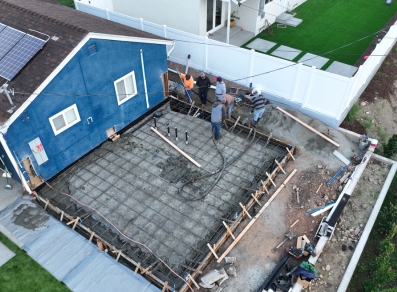AB 1033 opens the door to selling ADUs in San Diego
.jpg)
California’s push to expand housing options took a major step in October 2023, when Governor Gavin Newsom signed Assembly Bill 1033 into law in Sacramento. The bill gave cities the authority to let accessory dwelling units (ADUs) be sold separately from the main home, treating them like condominiums. While the law took effect statewide on January 1, 2024, it only became actionable in San Diego this summer, going into effect on August 22, 2025. This marks the first time San Diego homeowners can legally sell ADUs as standalone properties.
What AB 1033 proposes
AB 1033 gives California cities the option to let homeowners sell an ADU — often called a “granny flat” or “casita” — as a separate condominium. In other words, instead of only renting an ADU, owners could split their property into two homes: the main house and the ADU, each with its own legal title and mortgage.
The bill doesn’t force cities to allow this; it’s voluntary. Each city must choose whether or not to adopt the ordinance into its local housing rules. If they do, homeowners could gain a new way to build equity and create homeownership opportunities, while buyers could access smaller, more affordable homes in markets where traditional houses are often out of reach (California Legislature, 2023).
Why AB 1033 matters
AB 1033 is significant because it introduces flexibility into homeownership. Traditionally, ADUs could only be rented out, not sold separately. Supporters argue this could help first-time buyers and families priced out of traditional single-family homes while also creating generational wealth opportunities.
Implementation, however, varies by city. For example, San José became the first large city in California to approve AB 1033 in July 2024, making ADUs eligible to be sold as condos. Santa Cruz and Santa Monica have also adopted the law and integrated it into their municipal codes (San Francisco Chronicle, 2024; CapRadio, 2025). San Diego, by contrast, has been slower to act. The city did not adopt AB 1033 when it was first signed into law in October 2023 and only recently began formal steps toward implementation in mid-2025 (City of San Diego, 2025). Meanwhile, Berkeley is still in the drafting stage, and San Francisco is evaluating similar measures but has not yet enacted AB 1033 into its code (CapRadio, 2025). This uneven adoption highlights that while AB 1033 creates a statewide framework, its success will depend on how quickly and broadly cities embrace the opportunity.
Timeline & next steps
- February 15, 2023 – AB 1033 was introduced in the California Assembly
- May 31, 2023 – The Assembly passed AB 1033
- October 11, 2023 – Governor signed AB 1033 into law
- January 1, 2024 – AB 1033 took effect statewide, allowing local governments to adopt separate-sale ADU ordinances
- June 18, 2025 – San Diego City Council approved a package of 25 ADU reforms, which includes adopting AB 1033’s separate-sale option
- August 22, 2025 – The new ordinance allowing ADUs to be sold separately through condominium conversion goes into effect in San Diego
Quick tip: If you're planning to build an ADU or already own one, check whether your city has passed ordinances that enable AB 1033’s separate-sale option. Even though state law allows it, you’ll only be able to sell separately if your city opts in and meets the implementation rules (e.g. condo mapping, affordable unit criteria, etc.).
Xavier Rodriguez is the CEO of ADU Geeks, San Diego’s leading ADU consulting and project management firm. In 2024, the company was ranked No. 1 on the San Diego Business Journal’s Fastest Growing Private Companies list in the Small Business category, achieving 594.3% revenue growth.
Related ADU News
Looking for more ADU news? Continue exploring in-depth articles on California accessory dwelling unit laws, policy updates, and development trends.
.webp)
Ready to begin your journey?
Take the first step toward transforming your property and your life. Schedule a consultation with one of our experts and start your ADU journey today.



.jpg)
.svg)

